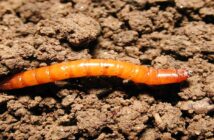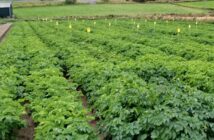A lack of knowledge about biopesticides is leading to inefficient application by growers and reducing the success rates of integrated pest and disease management programmes (IPDM).
To make application of biopesticides more efficient and effective, growers need to be provided with independent advice on which biopesticides to use under which circumstances and given more details on how they should be applied in practical situations.
Observation trials conducted throughout 2016 highlighted several opportunities to improve biopesticide performance through changes to application practices, based on improved understanding of the optimum conditions required for good performance of each biopesticide. This includes quantity of product used, quantity of water, location within the crop that should be targeted and other environmental parameters that could influence performance.
The trials were conducted as part of AMBER, a five-year project funded by AHDB with the aim of identifying management practices that growers could use to improve the performance of biopesticide products within IPDM.
David Chandler, principal research fellow at University of Warwick said: ‘It was clear from our observation trials that there was a lack of understanding about how biopesticide efficacy is affected by factors such as population sizes of pests and diseases, environmental factors such as exposure to UVA and B and water volumes.
More information needs to be given to growers on how to apply biopesticides in practical situations. This could be done through modifications to improve labeling”
Joe Martin, crop protection senior scientist at AHDB said “In a survey we conducted as part of AMBER, we found that growers perceived biopesticides to be unreliable, however we believe this could be in part as a result of incorrect applications. We need to make sure growers are provided with as much knowledge as possible about the optimum conditions required for good performance of each biopesticide in order to identify potential improvements in application.”
Biopesticides are plant protection products based on living microorganisms, plant or microbial extracts, or behaviour-modifying substances and are a key part of a successful IPDM. Within the next 20 years, the number of biopesticide products available is likely to exceed the number of conventional chemical pesticides. Biopesticides are low risk products for human and environmental safety and many are residue-exempt, meaning they are not required to be routinely monitored by regulatory authorities or retailers.
Gracie Emeny, knowledge exchange manager at AHDB said, “There is a huge opportunity to improve biopesticide performance by helping to increase growers’ knowledge in this area. Clear guidance needs to be given to growers to help them get the best from biopesticides and improve their IPDM programmes, particularly as the conventional chemical options available to them continue to reduce. A key part of AMBER will be sharing knowledge and experience from the trials with growers and the industry to improve best practice guidelines.”
AMBER trials will now focus on developing practices that optimise biopesticide performance and will be tested on commercial nurseries.
A new website has just been launched to keep growers updated with all the AMBER project news. It also contains useful information for anyone looking to find out more about biopesticides. Visit bit.ly/AMBERproject.




